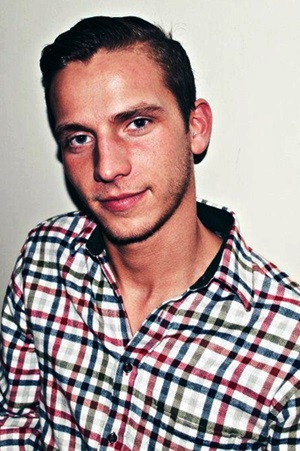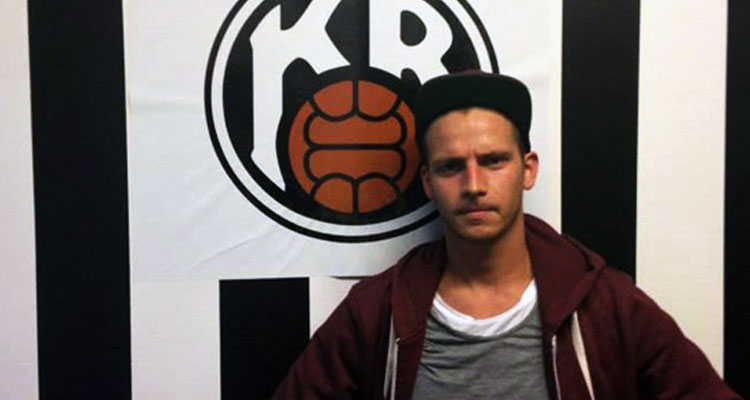“Supporters of other teams have on occasions made disrespectful remarks about my sexuality.”
Last year Daníel Örn Einarsson became the first Icelandic handball player to publicly say he’s gay and challenged the homophobic notion that sports and homosexuality don’t mix. He says gay athletes are still hesitant of coming out in Iceland, but shouldn’t feel pressured to. For Daníel Örn the response has been mostly positive, although sport fans have made disrespectful remarks about his sexuality.
– by Helgi Ómarsson
For those not familiar with your story, start by telling us a little bit about yourself.
“My name is Daníel Örn Einarsson and I was born on July 23rd 1988 in Garðabær, Iceland. I’m currently finishing my bachelors degree in anthropology from the University of Iceland. When I’m not studying I’m usually at Kex Hostel working or hanging out, I even study there a lot. I think I spend more time there than at home. As well as working and going to school I play handball for KR. So I don’t have much spare time. Usually I go out to eat or get drinks with friends. If I don’t feel like going out I watch TV shows, play football manager and push the refresh button on Facebook constantly.” He smiles.
When did you suspect you were gay?
“I think everyone knows around the age of puberty whether they’re gay or straight. However I chose to ignore my feeling and just tried to focus on other things and fit in. For many years I was able to convince myself I was attracted to girls. I didn’t even see “the warning signs” when I fantasized about men. Looking back I guess I always knew the truth deep down, but managed to suppress my true feelings. Which is not the most sensible way to go about it. After I became honest with my feelings, everything fell into place.”
When did you come out?
“I didn’t really have a “coming out moment”. I first met a guy in january 2009 and when that was going on I told my older  sister about it. After I stopped seeing the guy, I started hanging out with people who I had gotten to know through him and it was mainly in that group that I started to explore and felt comfortable being myself. Then by spring and over the course of the summer the word kind of spread. If asked whether I was gay, I slowly found the confidence to answer with a “yes”.
sister about it. After I stopped seeing the guy, I started hanging out with people who I had gotten to know through him and it was mainly in that group that I started to explore and felt comfortable being myself. Then by spring and over the course of the summer the word kind of spread. If asked whether I was gay, I slowly found the confidence to answer with a “yes”.
This was my way of doing things. I felt like I didn’t have to tell anyone, that it didn’t have to be a big deal. So in a way I never officially came out the closet. It just happened slowly and without any dramatic moments.”
What were friend’s and family’s reactions?
“They were all very supportive and basically said it didn’t matter whether I liked guys or girls as long as I was happy. In my parents opinion the happiness of their children is the only thing that matters. That’s a way of thinking I completely agree with.”
Which team were you playing for at the time?
“I want to start by saying that I began training handball around the age of 6 or 7, and like every boy who plays sports I wanted to be a professional athlete. I chose KR because the club trains less than the top division teams which made it possible for me to focus more on school and work. Before that I had a really nice time at HK under a great coach and with great teammates, after playing for KA, a very tight group with a lot of ambition, in Akureyri (a town in northern Iceland) for two years. But it was before that time, when I was still with Stjarnan, my hometown club, that I decided to come out.”
Where you nervous about your teammates reactions?
“At first I tought a lot about it. Thankfully most of them didn’t mind at all and their behaviour towards my didn’t change. Of course some guys were a little scared but didn’t show it directly. Once they saw I was still the same person it didn’t matter to them at all.
Then as time passed they started to feel comfortable talking about my sexuality and asked questions. Like for example how does a gay mind works when it comes to sex and relationship, what I find attractive in other guys and who does what in sex and that sort of stuff.”
Looking back, what did it feel like coming out?
“Relieving, in some ways. I admit I became more open, ’cause I wasn’t holding that part of me back anymore. I’m still the same person, my confidence just grew. So coming out felt great. But even tough it was overall pretty easy for me, it doesn’t have to be for other athletes. There can be many reasons for that, most importantly family and dressing room situations. Some athletes are for example open about their sexuality with family and best friends, but that doesn’t mean they are ready to open up to the sports industry as a whole.”
Do you think the Icelandic sports industry is discriminating against gay athletes?
“Overall the sports industry, at least in Iceland, is tolerant towards gays. I think athletes really don’t care that much about homosexuality. It’s mostly the people around them that have issues with it and by that I’m mean the fans and sponsors.
In Iceland the sponsor part doesn’t matter that much. Abroad it can make a lot of difference what the sponsors think because athletes, who are big names, have to maintain a certain image.
Fans are as different as they are many. However you find difficult ones everywhere.
Supporters of other teams have on occasions made disrespectful remarks about my sexuality. It’s not nice to hear but I know better than take them seriously. I don’t waste my energy by getting bothered. After all they wouldn’t be saying those things unless I was playing well against their team and more importantly, because they are ignorant.”
What about globally?
“Abroad and at a higher level the sports industry is not quite as tolerant. Yet. It’s definitely moving into the right direction, but there is still a long way to go. Once athletes continue to come out publicly, I think the conditions will become much better and different from say 5, 10 or 20 years ago, because western societies have changed a lot.”
What kind of
 reaction did you get after going public with your story?
reaction did you get after going public with your story?“Younger guys and coaches have thanked me for speaking out publicly, because it showed people I wasn’t a lesser athlete because of my sexuality, and that seems to have made a difference in certain situations. Guys have also talked to me about being gay. However those conversations are confidential. Others have to come out on their own terms, when or rather if they’ll be ready to do so.”
You seem very confident about being gay.
“Yes. At least I don’t hide my sexuality from anyone. I haven’t got any regrets about coming out and I’m not sorry about being gay. I accepted it a long time ago and now I’m just gay. It doesn’t change who I hang out with or what my interests are. I have gay and straight friends and I still like all the things I liked before I came out. Being gay is just one of the things I am. It doesn’t define me in any way. I’m just a guy that happens to be gay.”
Do you think discrimination against gay athletes will ever cease to exist?
“I’m afraid it will never stop, just like African athletes are still target of racial slur. Society will never be totally free of prejudice and discrimination. There will always be people who’ll see to that. That’s something we’ll have to live with and to remember to hold our head high.”



